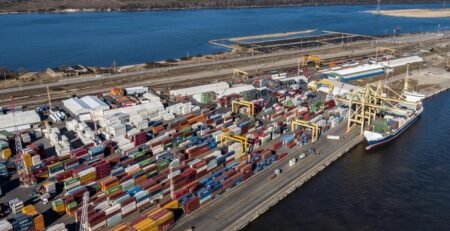FedEx Turns to Indian Researchers to Make Air Cargo Smarter

By Maria Kalamatas — August 29, 2025
CHENNAI — August 29, 2025. The campus of the Indian Institute of Technology Madras is usually filled with students rushing between lectures, not logistics executives in suits. But this week, FedEx parked one of its branded vans right at the entrance of the engineering block to mark the expansion of its SMART logistics center, a collaboration designed to inject artificial intelligence into one of the most unpredictable corners of the supply chain: air freight.
Inside a packed auditorium, professors, engineers, and FedEx managers debated algorithms while screens showed cargo flows mapped like subway lines. The goal is ambitious — to build systems that can anticipate delays, adjust routing on the fly, and even reduce idle time on airport aprons.
“We’ve been flying goods across continents for decades, but the complexity has never been greater,” said Raj Subramaniam, FedEx’s CEO, who flew in for the launch. “Partnering with IIT Madras allows us to experiment quickly and learn fast, something no global carrier can do alone.”
Why this matters for air cargo
Flying boxes may sound straightforward, but freight is constantly at the mercy of weather, traffic jams around airports, and customs queues that can stall shipments for days. FedEx executives believe AI models built in Chennai will allow them to see these disruptions before they bite, making air cargo both faster and more reliable.
The IIT Madras contribution
The research team here isn’t just crunching numbers. They are creating digital replicas of entire cargo journeys — what they call “digital twins.” Each twin mimics how a shipment moves from warehouse to aircraft, factoring in fuel burn, paperwork, and even labor strikes.
“Think of it as a rehearsal space,” explained Professor Ananya Krishnan, head of the AI lab. “We can stage a typhoon hitting Hong Kong or a customs slowdown in Frankfurt without risking a single package.”
India’s bigger role
For India, hosting the SMART center is a signal of how its logistics industry is evolving. With exports of pharmaceuticals and electronics climbing, and e-commerce shipments multiplying, the country is positioning itself not only as a manufacturing hub but also as a logistics innovation lab.
Outlook
The partnership is set to expand into trials on predictive flight scheduling and automated customs clearance next year. If the results match the ambition, the Chennai model could be cloned across FedEx hubs in Europe and the U.S.
For now, the unusual sight of a FedEx delivery van parked outside a university classroom is a reminder that the future of air cargo may be written not in warehouses or control towers, but on research campuses.
The post FedEx Turns to Indian Researchers to Make Air Cargo Smarter appeared first on The Logistic News.
Share this post
Related
Posts
The United States seizes a 7th tanker: pressure mounts on sanctioned ships
New episode in the maritime tug-of-war over sanctions: the United States has seized a seventh tanker suspected of operating in...
China replaces US barrels with Canada: new impact on tanker routes
The geography of oil is shifting, and shipping feels it immediately. According to analyzes reported by BIMCO, Chinese crude oil...
The Port of Klaipėda Signs a Record Year Driven by Containers, LNG, and Ro-Ro
The Lithuanian port of Klaipėda announces a historic performance in 2025: 39 million tons handled, despite a tense geopolitical context...
Ocean Alliance maintains the detour via the Cape, while preparing a “Suez plan”
The Ocean Alliance (CMA CGM, COSCO Shipping, Evergreen, and OOCL) has just unveiled its “Day 10” East-West network, which will...




